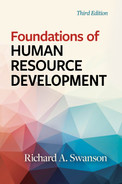Preface
Human resource development (HRD) is deeply concerned with developing and unleashing human expertise along with the dynamic issues of individual and organizational change. HRD is a very large field of practice and a relatively young academic discipline. Such a profession requires a complete and thoughtful foundational text—the purpose of this book. This is not a handbook of disparate stand-alone chapters by individual authors. Rather, it is an articulated text with a few selected contributions by noted scholars for the purpose of adding interest.
This third edition of Foundations of Human Resource Development is intended to help practitioners and academics by adding clarity to their professional journeys. While preferences about the purpose and primary means of doing HRD work are displayed, the attempt has been to provide a fair review of the range of major views that exist in the profession.
Most HRD books present their versions of best practices but do not probe more deeply into the foundations of practice. This book does the opposite. It is not a techniques of practice book. The underlying foundations of HRD are presented with exemplary overviews of practice. Readers here seek a deeper understanding of theory and models that support best practice; seek to understand the history and philosophies of HRD; seek to think more deeply about learning, performance, and change; and prefer to be reflective about their practice rather than blindly follow the latest gimmicks. Such readers will find this book a refreshing and thoughtful explication of the field.
Because the discipline of HRD is young, there has been relatively little work articulating the foundations of the field. The approach with this book is to draw boundaries without building walls. Thus, this book both advances and continues the conversation about HRD foundations. In a discipline as young as HRD, searching for a consensus about its foundations continues to be a work in progress.
This book is directed toward several audiences. First, it is designed for university courses in HRD. We argue that every HRD academic program needs a course that teaches its foundations. Second, HRD researchers will find this book a thought-provoking and useful guide to identifying important research issues. Third, this book is written for reflective practitioners who actively seek to lead the field as it grows and matures. Finally, almost every practitioner will find parts of the book that will add depth to their practice.
The twenty-three chapters are organized into seven parts. The first part, “Introduction to Human Resource Development,” establishes a basic understanding of what HRD is, the general HRD model and the process it relies on to do its work, and the history of HRD. Part 2, “Theory and Philosophy in Human Resource Development,” provides the important theoretical and philosophical foundations of HRD. Both of these perspectives have generally been missing among HRD professionals and are believed to be essential for understanding and advancing the field. Part 3 is titled “Perspectives of Human Resource Development.” It explores the learning and performance paradigms of HRD and associated models within each. This section attempts to clarify the learning-performance perspectives, their logical connection, and the underlying information and communication technology.
Part 4, “Developing Expertise through Training and Development,” captures the essence of the training and development component of HRD as well as the nature of expertise. Illustrations of training and development practice employed in host organizations are presented along with variations in core thinking, processes, interventions, and tools. Part 5, “Unleashing Expertise through Organization Development,” describes the essence of the organization development component of HRD and the nature of the change process. This section also presents examples of organization development and variations in core thinking, processes, interventions, and tools.
Part 6, “Advancing Human Resource Development,” focuses on HRD’s role in the high-level organizational and system-level issues of strategy, assessment, and policy and planning. Part 7, “Human Resource Development into the Future,” serves as springboard for the facing human challenges, blistering technology, globalization, and the century ahead.
My sincere thanks go to the HRD scholars throughout the world for their good work. They have made this book possible. Elwood F. Holton III and I were responsible for the first edition, and I am responsible for the second and this third edition. A very special thanks to several HRD colleagues for providing contributions in this third edition related to their specializations: Mesut Akdere, Theo J. Bastiaens, Ajit Bhattarai, DaeSeok Chai, Thomas J. Chermack, Toby M. Egan, Elwood F. Holton III, Patricia A. McLagan, Wendy E. A. Ruona, Richard J. Torraco, Karen E. Watkins, and Hyung Joon Yoon. Their perspectives and voices add an important dimension.
Finally, I want to express my deepest gratitude to Lesley Iura, Director of Professional Publishing, Berrett-Koehler Publishers, for her competent assistance with this book, and to Steve Piersanti, Founder of Berrett-Koehler Publishers, for supporting my publishing efforts for so many years.
Richard A. Swanson
Saint Paul, Minnesota, USA
IMPORTANT NOTE: Instructional support materials for each book chapter can be found on this website: www.texbookresources.net
